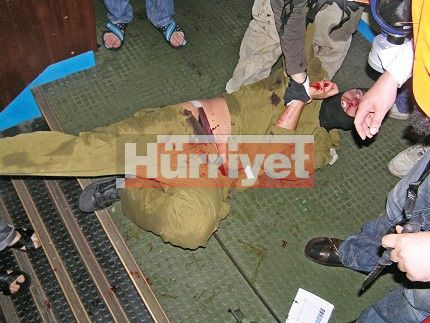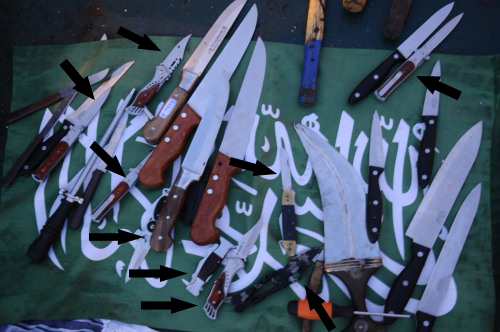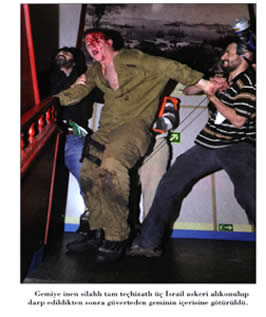by Gilead Ini
The United Nations’ Human Rights Council (HRC) voted on June 2, 2010 to investigate, in the words of the its resolution, "violations of international law ... resulting from the Israeli attacks on the flotilla of ships carrying humanitarian assistance." The Council subsequently established a three member fact-finding mission, and on Sept. 22 published an advance unedited version of the group’s conclusion.
The vote and investigation were the latest examples of what UN secretary general Ban Ki Moon once described as the Council’s "singling out" of Israel, and what his predecessor Kofi Annan had termed its "disproportionate focus" on the Jewish state.
The obsession with Israel on the part of the Human Rights Council is certainly significant and worthy of comment on its own. It is, after all, nothing less than bigotry and injustice to consistently judge one country by a particular set of standards while failing to apply those standards to the rest of the world. (The separate standard for the rest of the world is most notable when it involves regimes that voted to investigate Israel. For example, even as HRC member Kyrgystan was sitting in judgment of Israel's naval operation, hundreds of thousands of minority Uzbeks were forced from their homes in that country by brutal, gruesome violence at the hands of their Kyrgyz neighbors. )
That said, it is not necessary to focus HRC’s discriminatory treatment of Israel to raise serious concerns about its report. The text itself, which goes so far as to accuse Israel of summary execution and torture of innocent passengers, is deeply flawed, leading the U.S. ambassador to the Council to criticize its "unbalanced language, tone and conclusions."
The mission's shocking conclusions rely in large part on its insistence that accusations leveled by anti-Israel activists will supercede video evidence released by Israel. As the report states,
In ascertaining the facts surrounding the Israeli interception of the Gaza-bound flotilla, the Mission gave particular weight to the direct evidence received from interviews with eye witnesses and crew, as well as the forensic evidence and interviews with government officials. In light of seizure of cameras, CCTV footage and digital media storage devices and of the suppression of that material with the disclosure only of a selected and minute quantity of it, the Mission was obliged to treat with extreme caution the versions released by the Israeli authorities where those versions did not coincide with the evidence of eyewitnesses who appeared before us.
(The eyewitnesses, it is worth noting, almost certainly included Ken O’Keefe, a former Marine who insists the U.S. is "the number one terrorist on the face of the planet" and argues the 9/11 attacks were an "inside job" perpetrated by the American government and the Israeli Mossad.)
That the mission admits to valuing claims by radical anti-Israel activists over footage, photos and statements by Israel should by itself raise grave doubts about its conclusions. Yet even this striking evidentiary bias cannot explain some of the report’s glaring problems, including a number of blatant falsehoods that serve to downplay the violence faced by the Israeli soldiers boarding the Mavi Marmara, the Turkish ship on which the intense fighting occurred.
Weapons
 |
More specifically, the report asserts that
the Mission has found no evidence of knives being taken on board by passengers except for one traditional ceremonial knife. However, the Mavi Marmara had six kitchens, each of which was stocked with usual culinary knives.
Unless the Mission has its own unique definition of "usual culinary knives," this statement reveals just how credulous the mission was with regard to self-serving claims by activists. Their claims were apparently considered true even when they are contradicted by images from sources other than Israel. Photos first released in Turkey, and later disseminated by Reuters, show a passenger holding a half-serrated knife above an injured soldier and a puddle of blood. (Click on the above photo for a close up of the weapon, which clearly is not a "usual culinary knife.")
 And notwithstanding that the Mission gave itself license to ignore Israeli images, a photo released by the IDF shows a significant number of folding, combat-style knives among the kitchen knives found on board.
And notwithstanding that the Mission gave itself license to ignore Israeli images, a photo released by the IDF shows a significant number of folding, combat-style knives among the kitchen knives found on board. The report again downplayed the level of opposition Israel faced when boarding the ship with its claim that
Although there does not seem to have been a coordinated plan involving all passengers, some individuals grouped together with the intention to defend the ship. There is little evidence of any unified command to coordinate the defence of the ship.
But even Ken O’Keefe, the former marine involved in attacking Israeli troops on the Mavi Marmara, admits there was indeed a very well-coordinated group determined to clash with the Israeli soldiers, complete with team leaders, deputies and instructions from on high. As O’Keefe told Ha’aretz:
When we were at sea, the IHH asked some of us, the passengers, if we would agree to take part in the defense. I was asked whether I wanted to film or help out. Team leaders were assigned to every area of the ship. Our area was the stern. I was one of a group of six and there was a Turk who was in charge of us. Because of my background and military experience, I was appointed his deputy.
Civilians Participating in Combat
Along with these specific allegations in the report, which evidence reveals to be untrue, the report makes the general claim that
Flotilla passengers were civilians and in the context of the interception of the vessels must be considered as protected persons. Under article 4 Fourth Geneva Convention, protected persons are those who, at a given moment and in any manner whatsoever, find themselves in the hands of a part to the conflict of occupying Power of which they are not nationals. In a situation of armed conflict, military force can only be used against a combatant or against civilians participating actively and directly in combat activities, which cannot be said of the civilians on the Mavi Marmara.
 So the report insists that the passengers, who are described as civilians, did not participate in combat activities. Yet the same report elsewhere acknowledges that "a number of the passengers on the top deck fought with the soldiers using their fists, sticks, metal rods and knives" and, in a bland understatement sharply contrasting with report’s detailed allegations of Israeli misconduct, admits that "during the initial fighting on the top deck three Israeli soldiers were taken under control and brought inside the ship." (The report buries this information about the capture of Israeli soldiers, placing it out of chronological order so that it is impossible for readers to know that the intense fighting occured after Israeli soldiers were taken hostage.)
So the report insists that the passengers, who are described as civilians, did not participate in combat activities. Yet the same report elsewhere acknowledges that "a number of the passengers on the top deck fought with the soldiers using their fists, sticks, metal rods and knives" and, in a bland understatement sharply contrasting with report’s detailed allegations of Israeli misconduct, admits that "during the initial fighting on the top deck three Israeli soldiers were taken under control and brought inside the ship." (The report buries this information about the capture of Israeli soldiers, placing it out of chronological order so that it is impossible for readers to know that the intense fighting occured after Israeli soldiers were taken hostage.)The International Committee of the Red Cross explains that civilians are immune from direct attack "unless and for such time as they take a direct part in hostilities." And while the ICRC goes on to note that a precise definition of the term "direct participation in hostilities" does not exist, it does point out that the term is generally understood to mean "acts which, by their nature or purpose, are intended to cause actual harm to enemy personnel and matériel."
The Humanitarian Spirit
A concluding paragraph to the report asserts that "all the passengers on board the ships comprising the flotilla who appeared before the Mission impressed the members as persons genuinely committed to the spirit of humanitarianism and imbued with a deep and genuine concern for the welfare of the inhabitants of Gaza."
This statement, which underscores again the mission’s credulous acceptance of the activists’ narrative, might mean that the passengers who chanted "Khaybar Khaybar oh Jews, the army of Muhammad will return" — a reference to the bloody defeat of Jews at the hands Muhammed’s army in the Arabian town of Khaybar — were deemed to be moved by the spirit of humanitarianism; or it may mean that such radical passengers did not "appear before the Mission," and therefore that the testimony it received was not representative.
And what of passengers like Ra'ad Salah, head of the northern branch of the Islamic Movement in Israel, a man who has argued that Jews used the blood of children to make matza? Does the mission consider him to be genuinely committed to the spirit of humanitarianism?
As noted in Ha'aretz, Salah once told his followers:
We have never allowed ourselves to knead [the dough for] the bread that breaks the fast in the holy month of Ramadan with children's blood. Whoever wants a more thorough explanation, let him ask what used to happen to some children in Europe, whose blood was mixed in with the dough of the [Jewish] holy bread. Great God, is this a religion? Is this what God would want? God will deal with you yet for what you are doing.
Dreams of Martyrdom
Significantly, the report made no mention of the some passengers' openly expressed desire to be killed while fighting. (This, too, reveals that rather than being moved by the spirit of humanitrianism, a number of passengers were driven by radical religious motivations.)
For example Ali Haydar Bengi, who was killed during the clashes on the Mavi Marmara, told his friend before embarking on the journey that he wanted to become a martyr. Other passengers expressed similar sentiments.
This desire for martyrdom could help explain why certain passengers engaged in such reckless acts as violently attacking professional soldiers. It is inexplicable then that the report, which is loaded with details meant to incriminate Israel, would omit such details about the passengers.
Torture
One of the most shocking allegations in the report is that Israeli troops on the ships engaged in "inhuman" behavior, or worse yet, torture.
A closer examination of the report, though, suggests there is less to this charge than meets the eye. Under a heading alleging "torture and other cruel inhuman and degrading treatment or punishment," the report referenced tightly applied plastic handcuffs, passengers having to kneel on the deck after being captured, rough physical treatment, limitations on toilet use, and even "verbal abuse."
Of course, there is not a Western democracy in the world — never mind conditions in Saudi Arabia, Cuba, Russia and Pakistan, Human Rights Council members that voted to back the report — in which unruly detainees are not tightly handcuffed, shoved, or shouted down. In this case, moreover, the detainees were part of a group engaged in bloody attacks against soldiers while seeking to set a precedent that would allow unfettered deliveries to a terrorist government sworn to Israel's destruction. And yet, of all the tight handcuffs applied every day across the globe, it seems that only those applied by Israel are publicly and prominently denounced by the Human Rights Council as tools of torture.
The Catch-All
Another of the report's questionable techniques stems from its conclusion that "the blockade was inflicting disproportionate damage upon the civilian population in the Gaza Strip and as such the interception could not be justified and therefore has to be considered illegal." With the interception itself deemed illegal, the report could then consequently judge everything involved in the re-routing of the ships to be illegal. (For example: "Since the Mission considers the Israeli interception of the flotilla was unlawful, the detention of passengers on board each of the vessels was also prima facie unlawful.")
Rather, the blockade, and by extension the interception of the Mavi Marmara and its companion ships, is part of an Israeli policy meant to preventing unfettered access of cargo ships to Gaza. This is seen as an essential security measure in light of ongoing attempts to smuggle weapons and other goods that would empower Hamas, which rules the territory, continues to direct attacks against Israel, and is opposed to the peace process.
Second Investigation
A separate United Nations inquiry, which was put together by UN Secretary General Ban Ki Moon, is currently underway. Unlike with the Human Rights Council inquiry, which was seen as politicized and biased, Israel has decided to cooperate with, and even participate in, this investigation. Hopefully this mission will avoid the same mistakes made by the Human Rights Council.
Gilead Ini
Copyright - Original materials copyright (c) by the authors.
No comments:
Post a Comment